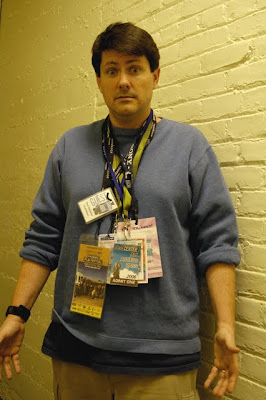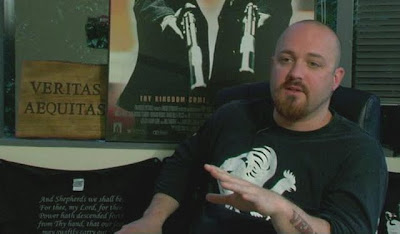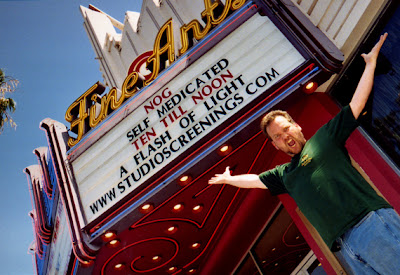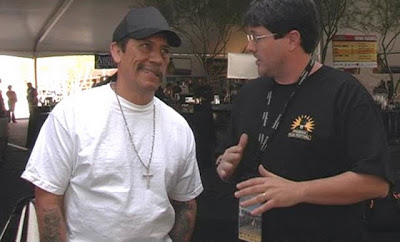Now Available to Own
Back in 2008, a Park City, Utah sized ski mountain of 2,051 film submission packets were sent to Robert Redford's holy grail of film festivals regardless of the fact that there were only 16 competitive slots available at Sundance. Similar to the way that Ivy League schools are flooded with applications and rake in the dough from those who realistically may have zero chance of ever getting to wear Harvard Crimson, Yale Bulldog Blue (or receive the envied Sundance swag), filmmakers will not be dissuaded from playing the lottery by shooting for those hallowed halls or auditoriums.
And the reason they go through the agony is simple: like Cinderellas waiting for their Prince Charmings or filmmakers waiting for their own versions of Bob and Harvey Weinstein, they've all heard the fairy tales of former indie icons turned major directors like Steven Soderbergh, Quentin Tarantino, Robert Rodriguez, Edward Burns, and Kevin Smith who were plucked out of obscurity and given the glass slipper of theatrical distribution, studio contracts, and best of all, the chance to pay off the dozens of credit cards a majority of entrants used to finance their films in the first place.
And even though some modern filmmakers still opt for the expensive but gorgeous look of celluloid film stock, with digital video cameras both readily available and on the cheap along with screenwriting, editing, and musical mixing computer software, we have more filmmakers than ever, opting for a do-it-yourself method and the ability to make a film for next to nothing.
While some of the '80s and '90s independent films were undoubtedly of low quality as well, today in the advent of YouTube and too-much-information, everyone can become a filmmaker. And because it seems like a great democratization of the industry, they shoot for the moon as obviously, Sundance remains the premiere festival in the country to play.
Yet as an astute interviewee remarks in this fascinating documentary, just because you can make a film, it doesn't necessarily mean you should... however, the same can be said for putting on film festivals. Essentially our country is flooded with festivals, which have become a never-ending convention for struggling filmmakers wherein some provide invaluable resources for networking and literal accolades and others which are run out of a van or as we find out in the film, barely run at all.
Yet when you understand how many official rejection letters were sent out in stark contrast to Sundance's 16 titles deemed official selections, which increasingly involve Hollywood stars slumming it in “indiewood” for the chance to appear in a film not made opposite a green screen, it's no wonder that so many filmmakers then decide to take the roughly year long festival circuit express to find if not acceptance than at least an audience.
While one would assume that actually making the movie would be the biggest hurdle, as we're quick to discover in Paul Osborne's wise, heartbreaking, passionate, and darkly funny insider's documentary, once the film is finally cut the way they'd want it to play, the real work begins as marketing the movie and getting it into the hands of others becomes a full-time job.
If they're lucky enough not to have maxed out their cards on production budgets, playing the festival game suddenly begins requiring every single card in their wallets. While a majority of filmmakers still have their day jobs out of necessity unless they're being temporarily supported by a significant other and risk the high incidence of eventual breakups from separation, stress, finances, and the emotional rollercoaster of the lengthy process, they also begin their second job as their own PR mastermind immediately.
Designing and ordering postcards, fliers, stickers, and promotional items along with screeners, postage and more to create their own do-it-yourself press kits they submit along with paperback book length admission forms and of course an admission fee that may run filmmakers anywhere from $50 to $100 for each and every festival, filmmakers stockpile rejection slips until finally an acceptance appears.
Yet, then the question comes becomes, "is it the right venue to hold your premiere" as we discover that filmmakers can debut too early or too late in the film fest equivalent of knowing if it'll be a white wedding or one whereas they may as well just wear the brightest dress they can find, since the film has been screened everywhere.
Chronicling his own journey of bringing the film he wrote and his friend Scott Storm directed Ten 'Til Noon to the various festivals across the country, documentarian Paul Osborne makes what he shares is a not just a cathartic work having lived the experience but one he wished he'd had beforehand, realizing that no films detailed "the festival circuit" in a way "that could help [him] understand the politics [he] was facing." The result is Official Rejection, Osborne's fascinating, no-holds-barred examination of what really happens when the shooting ends and a lavish La La Land wrap party, red carpet premieres, international press, and/or studio run marketing campaigns aren't in a filmmaker's corner.
Featuring candid interviews with festival directors, programmers, volunteers and others who have braved the circuit including Kevin Smith, Bryan Singer, Troy Duffy, The Office's Jenna Fischer, Blayne Weaver, and several others, Official Rejection is an in-depth examination of the state of modern independent film.
Weighing the pluses and minuses of the festival circuit, we witness Osborne and Storm's own journey to find some festivals which are genuinely passionate about fostering a community and delivering excellent programming and others where the overall goal seems to be in creating a less than stellar lineup as long as they can add more “exclusive” works or world premieres to their festival guides.
In fact, we're flabbergasted by the unprofessional tactics of either trying to blackmail a filmmaker into pre-selling their own performances in a completely different state or their movie will be pulled or by stealing movies from other festivals as a very prominent festival tries to talk Osborne and Storm out of their commitment to another festival with mean-spirited gossip and warnings.
Along with author Chris Gore's well-respected Ultimate Film Festival Survival Guide, this movie should be mandatory viewing for those who attend, work, or run festivals. Furthermore, it's of particular interest to moviegoers who are simply confused by just what constitutes an independent film anymore.
Post-Miramax, the term "independent" has been thrown around as hastily as calling something "genius" and sure enough the true, few and worthwhile do-it-yourself indies (which are now nearly drowned in a sea of far too many and far too poorly made works) find themselves unwittingly in competition with big budget or studio backed films. With faux "independent" marketing campaigns, loose labeling or "independent" divisions of major studios, real independent films suffer by comparison to the Hollywood polish of movies such as American Beauty Oscar winner Sam Mendes' Away We Go, Oscar winner Steven Soderbergh's Warner Brothers feature The Informant! and Oscar nominated Jason Reitman's Up in the Air, all of which are included on my Top 10 list for 2009 alongside truly independent made works.
Similarly, I enjoyed Official Rejection on a number of levels. While overwhelmingly, it was a blast to watch as a critic who was delighted to put names with the faces of some of the individuals whose movies I've reviewed in the past (like Blayne Weaver who made the charming Weather Girl) or see a candid Kevin Smith whose new box set was right next to this screener, I found it particularly revealing as a former film festival volunteer supervisor, grant and film summary writer as well.
In this sense, Rejection provided me with a rare glimpse of perceiving the festival from the perspective of not a worker or a press member but instead via those who fly in (often on their own dime at some of the festivals showcased) and realize that just because they're in the festival, it doesn't automatically guarantee that anyone will buy their movie's tickets without some good old fashioned shoe leather, flier hand-outs, and local press visits.
Additionally, wanting to ensure that viewers would have as much information as they wanted that couldn't fit into the running time, deleted scenes and extended conversations are contained on a second disc as witnessed in a particularly revealing interview with Kevin Smith who humbly discusses his Clerks experience and admits that he doubts he'd get chosen for Sundance today, or practical tales from the battlefield from the kindhearted Lollilove writer/director Jenna Fischer.
Likewise, since Arizona's acclaimed Phoenix Film Festival was featured in great detail for not only airing Osborne and Storm's earlier film Ten Til Noon but also screening this title as well in 2009, it was enjoyable to see from a local perspective. Celebrating the fact that the Phoenix Film Festival was actually created by independent filmmakers all too familiar with what it means to spend over a year in their shoes, Official Rejection also gives you the chance to do the same as well for its 107 minute running time that may wind up changing the way you think about not just festivals but the importance of groundbreaking, risk-taking, entertaining and worthwhile independent film in general.
Text ©2009, Film Intuition, LLC; All Rights Reserved. http://www.filmintuition.com
Unauthorized Reproduction or Publication Elsewhere is Strictly Prohibited.
FTC Disclosure: Per standard critical practice, I received a screener of Official Rejection to use for my review but this had no impact on my evaluation of the film, which incidentally championed the importance of critics whose words last forever.

































